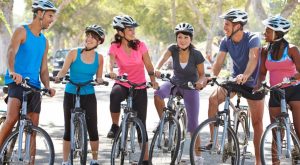
What Weekend Adventures Create Monday Morning Momentum?
The weekend represents more than just a break from the office routine. For many professionals, those precious 48 hours offer a chance to reset mentally while experiencing the great outdoors.
Cycling has become a popular weekend pursuit for busy individuals seeking both adventure and practical benefits that carry over into their working lives.
The versatility of off-road bicycles explains their growing popularity among business professionals. These bicycles blend road efficiency with trail capability, allowing riders to transition seamlessly between tarmac and trails without specialised technical skills.
Lightweight models, with their reduced weight and improved vibration control, have become particularly sought after for those wanting better comfort during longer rides.
Outdoor exercise such as cycling is widely regarded as beneficial for overall wellbeing. Regular activity can help sharpen focus, reduce stress, and support creative thinking, especially when combined with time spent in nature. Navigating varied landscapes also helps keep riders alert and engaged.
How Weekend Cycling Creates Professional Momentum?

Weekend cycling offers professionals a helpful way to reset and return to work with renewed energy. The varying terrain found during rides in parks, on towpaths, or through forest tracks stimulates the mind.
It keeps problem-solving abilities sharp. Many professionals note higher productivity after adopting these cycling habits.
The positive effects of a good ride can last beyond the morning after. Tackling new paths and unpredictable surfaces may help support skills like decision-making and planning.
According to gravel cycling specialists Sigma Sports, these benefits help explain why many business-focused riders now prefer this style over traditional road cycling.
Cycling requires quick route choices in challenging British weather and terrain. This can help develop mental agility, which may translate into being quicker and more adaptable in the boardroom.
Responding to a technical climb in Kent or a muddy descent near Manchester can build decision-making that pays off at work.
The Science Behind Cycling and Cognitive Performance
Many believe that regular cycling can improve mental sharpness and resilience. Mixed-surface riding keeps attention high, demanding quick thinking as the ground changes.
This mental workout can help train the brain to juggle tasks and priorities, making it easier to stay organised.
Switching to a carbon frame is often said to make a noticeable difference. The lightweight design and vibration-absorbing properties may lead to fewer aches and clearer thoughts after each outing.
Riders often feel more prepared for Monday’s meetings. Those who choose carbon frames sometimes report reduced fatigue on longer journeys.
Recovery Metrics That Matter for Professionals
For busy professionals, tracking the right recovery indicators can improve the benefits of weekend rides. Sleep quality stands as perhaps the most important metric.
Many people notice improved deep sleep patterns after moderate cycling sessions. Resting heart rate provides another simple measure, which may show a gradual decrease as fitness improves.
Heart rate variability (HRV) is gaining popularity as a recovery tool. Current fitness trackers measure HRV with minimal effort.
They show when the body is ready for more activity or needs rest. This helps professionals schedule tough tasks when they feel sharpest, often after those weekend rides.
Structuring Weekend Rides for Maximum Professional Benefit

Professionals seeking the greatest benefit from weekend cycling often keep rides within the hour to ninety-minute range.
This window is thought to promote gains in both fitness and mental wellbeing without cutting into other commitments. Even those pressed for time can fit in a shorter ride that acts as a reset.
Careful use of recovery tracking helps professionals get more from their training. Monitoring sleep patterns after a ride shows how training fits with the week’s demands.
Wearable tech or simple phone apps track sleep and daily heart rate, making it easier to judge the day’s workload.
The 80/20 Approach to Weekend Cycling
Time-constrained professionals can benefit from applying the Pareto principle to their cycling routine. This approach focuses on the 20% of cycling elements that deliver most of the rewards.
For many busy riders, this means prioritizing route variety over distance and consistency over occasional long rides.
Even short rides that include varied surfaces and modest hills may help trigger responses that improve workplace focus.
This efficiency-focused approach meets the needs of professionals who need to balance weekend recovery with family commitments and work preparation.
From Trail to Boardroom: Transferable Skills

Tackling rough ground on a bike encourages fast, realistic choices about the best line and responding to sudden hazards.
These habits match the snap decisions required in business discussions or during negotiations. Riders learn to assess situations, commit to action, and remain steady under pressure.
Learning to pace oneself on a long ride parallels energy management in project teams or during major launches.
Cyclists understand the danger of starting too fast, adjusting their approach to finish strong. This careful use of resources provides a model for completing work projects without burnout.
Getting used to sudden rain or shifting terrain helps riders become more comfortable with change. Quick strategic switches during a ride become second nature, similar to adjusting business strategies when market conditions shift. Accepting change supports a responsive mindset that leads to business growth.
Bike selection itself is an exercise in practical decision-making. Those seeking reliability may select aluminium frames set up for everyday British conditions.
Others take the long view, opting for carbon frames that bring performance gains and less fatigue over repeated rides. The choice is often guided by durability, comfort, and budget.
Turning Rides Into Business Advantage
Weekend cycling adventures offer dynamic opportunities for professionals to improve both wellbeing and performance at work.
Practical cycling routines create space for recovery, build mental skills, and encourage habits that translate into sharper decision-making. Selecting the right bike supports these goals while serving as an investment in personal growth.
Adding cycling to a weekly routine can help professionals return to work with renewed energy and a refreshed outlook. The lessons learned on the trails about resource management, risk assessment, and flexibility may have lasting workplace impact.
Through intentional choices about equipment, professionals can turn weekend pursuits into Monday momentum.





